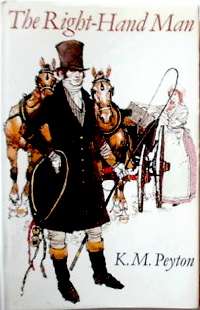The Right-Hand Man
 First edition cover | |
| Author | K. M. Peyton |
|---|---|
| Illustrator | Victor Ambrus |
| Country | United Kingdom |
| Language | English |
| Genre | Children's novel |
| Publisher | Oxford University Press (UK) |
Publication date | 1977 |
| Media type | Print (Hardback) |
| Pages | 218 pp (UK hardback first edition) |
| ISBN | 978-0-19-271391-9 (UK hardback first edition) |
| OCLC | 3735422 |
| LC Class | PZ7.P4483 Ri |
The Right-Hand Man is a young adult historical novel by K. M. Peyton, first published in 1977. The book is set in 1818 in Essex and London, during the Georgian era. It tells the story of Ned Rowlands, a talented stagecoach driver who meets the three creatures he loves best on the same day: a horse, a woman, and the man who will become his employer, (Lord Ironminster).
Lord Ironminster was a renowned and daring dragsman until he lost his right arm and his father in an accident. He is sick with consumption (tuberculosis) and under pressure from his mother to marry a suitable wife, settle down and produce an heir. Lord Ironminster is more interested in winning a wager of 5,000 pounds to race from his home to Whitechapel Church in less than 75 minutes. His cousins (who will inherit on his death) are also keen to win the wager.
The story details how Lord Ironminster tricks Ned Rowlands into coming to work for him as his coachman (his right-hand man), their efforts to win the wager, and the friendship that develops between them.
Film
| The Right Hand Man | |
|---|---|
| Directed by | Di Drew |
| Based on | novel by K. M. Peyton |
| Starring |
Rupert Everett Catherine McClements Hugo Weaving |
Release dates | 1987 |
| Country | Australia |
| Language | English |
| Budget | A$5,459,000[1] |
| Box office | AU $9,660 (Australia)[2] |
The Right Hand Man was made into a film in 1985, and released in Australian cinemas in November 1987.
Production
K. M. Peyton's novel had been options by actors Steve Grives and Tom Oliver who formed a company, Yarraman, to make the film. Grives had acted in a mini series, Flambards also based on a novel by Peyton.[3]
Money was raised through the company UAA to make the movie which was mainly shot around Bathurst, New South Wales, in particular at Abercrombie House.[4] The shoot began 9 October 1985 and went for ten weeks.[5]
Release
The film was not a large success at the box office.[4]
References
- ↑ "Production", Cinema Papers, March 1986 p62
- ↑ "Australian Films at the Australian Box Office", Film Victoria accessed 24 October 2012
- ↑ "Sticking to the ley-lines", Cinema Papers, January 1986 p44
- 1 2 David Stratton, The Avocado Plantation: Boom and Bust in the Australian Film Industry, Pan MacMillan, 1990 p1610-161
- ↑ "Production round-up", Cinema Papers, November 1985 p48
External links
- The Right Hand Man at IMDB
- Gallery of pictures from film at Di Drew's website